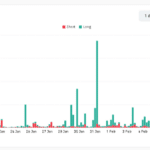By Christine Harper and Christopher Condon
Jan. 30 (Bloomberg)
James “Jes” Staley, head of JPMorgan Chase & Co.’s investment unit, said the $4 trillion money-market fund industry is the “greatest systemic risk” to the financial system that hasn’t been adequately addressed.
“What keeps me up at night most of anything we do at JPMorgan Asset Management is the money-market fund space,” Staley said at a discussion hosted today by Credit Suisse Group AG in Davos, Switzerland. “One of the things that has to come out and get a lot more attention and discussion is how do we take the systemic risk posed by money funds out of the system?”
JPMorgan Asset Management oversees about $500 billion of money-market funds, Staley said. The funds aren’t allowed to set aside capital to absorb investment losses, leaving no “margin of error” against a potential collapse, he said.
Staley’s remarks follow a set of proposed regulatory changes for the money-market fund industry from the Group of Thirty, an independent policy organization whose members include Treasury Secretary Timothy Geithner and Lawrence Summers, head of the White House’s National Economic Council.
The recommendations, if adopted by regulators, would force money funds to choose between accepting banking-industry controls or giving up accounting rules that help them maintain a stable $1-a-share net asset value, or NAV, which make them the safest investment after bank accounts and Treasury bonds.
The proposals in the Group of Thirty’s Jan. 15 report were made in reaction to the collapse of the $63 billion Reserve Primary Fund in September. Reserve Primary became only the second money fund to drop below $1 a share, or break the buck, because of losses on debt issued by bankrupt Lehman Brothers Holdings Inc.
Reserve Primary’s fall triggered an industrywide run on money-market funds that invest in corporate debt. That, in turn, froze the global commercial-paper market, cutting off a source of short-term capital for thousands of companies.
“The widespread run on money-market mutual funds has underscored the dangers of institutions with no capital, no supervision and no safety net operating as large pools of maturity transformation and liquidity risk,” the report said.
JPMorgan’s Staley blamed money funds for Lehman’s collapse and the near bankruptcy of Bear Stearns Cos. last year. The funds, which typically hold highly rated, short-term debt instruments, were forced to pull their money from the firms when they saw signs of trouble, he said.
Money-market funds regulated by Rule 2a-7 of the Investment Company Act of 1940 strive never to fall below a $1 NAV, preserving investors’ principal while paying interest. Fund investments are restricted to highly rated securities maturing in 13 months or less and don’t have to be marked to market value every day.
Laurence Fink, chief executive officer of BlackRock Inc., the largest publicly traded U.S. asset manager, said he favors the Group of Thirty proposals.
“We believe the money-market business, which is essentially a shadow banking business, should be treated like a banking business with capital charges associated with it, or reserves associated with it,” Fink said in a conference call with analysts Jan. 21.
“We are aware of the recommendations and we are studying them,” John Heine, spokesman for the U.S. Securities and Exchange Commission, the principal regulator of money funds in the U.S., said.
JPMorgan Asset Management oversees about $1.1 trillion for its clients, including $500 billion in money-market assets, Staley said.
Monday, February 2, 2009
Subscribe to:
Post Comments (Atom)




No comments:
Post a Comment